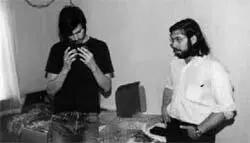And yet, I wonder. The Dutch seem to live their lives up to their necks in rules and regulations. There's so much you can't do there; is there really nothing you can't say?
Certainly the fact that they value open-mindedness is no guarantee. Who thinks they're not open-minded? Our hypothetical prim miss from the suburbs thinks she's open-minded. Hasn't she been taught to be? Ask anyone, and they'll say the same thing: they're pretty open-minded, though they draw the line at things that are really wrong. In other words, everything is ok except things that aren't.
When people are bad at math, they know it, because they get the wrong answers on tests. But when people are bad at open mindedness, they don't know it. In fact they tend to think the opposite. Remember, it's the nature of fashion to be invisible. It wouldn't work otherwise. Fashion doesn't seem like fashion to someone in the grip of it. It just seems like the right thing to do. It's only by looking from a distance that we see oscillations in people's idea of the right thing to do, and can identify them as fashions.
Time gives us such distance for free. Indeed, the arrival of new fashions makes old fashions easy to see, because they seem so ridiculous by contrast. From one end of a pendulum's swing, the other end seems especially far away.
To see fashion in your own time, though, requires a conscious effort. Without time to give you distance, you have to create distance yourself. Instead of being part of the mob, stand as far away from it as you can and watch what it's doing. And pay especially close attention whenever an idea is being suppressed. Web filters for children and employees often ban sites containing pornography, violence, and hate speech. What counts as pornography and violence? And what, exactly, is "hate speech?" This sounds like a phrase out of 1984.
Labels like that are probably the biggest external clue. If a statement is false, that's the worst thing you can say about it. You don't need to say that it's heretical. And if it isn't false, it shouldn't be suppressed. So when you see statements being attacked as x-ist or y-ic (substitute your current values of x and y), whether in 1630 or 2030, that's a sure sign that something is wrong. When you hear such labels being used, ask why.
Especially if you hear yourself using them. It's not just the mob you need to learn to watch from a distance. You need to be able to watch your own thoughts from a distance. That's not a radical idea, by the way; it's the main difference between children and adults. When a child gets angry because he's tired, he doesn't know what's happening. An adult can distance himself enough from the situation to say "never mind, I'm just tired." I don't see why one couldn't, by a similar process, learn to recognize and discount the effects of moral fashions.
You have to take that extra step if you want to think clearly. But it's harder, because now you're working against social customs instead of with them. Everyone encourages you to grow up to the point where you can discount your own bad moods. Few encourage you to continue to the point where you can discount society's bad moods.
How can you see the wave, when you're the water? Always be questioning. That's the only defence. What can't you say? And why?
Chapter 4. Good Bad Attitude
To the popular press, "hacker" means someone who breaks into computers. Among programmers it means a good programmer. But the two meanings are connected. To programmers, "hacker" connotes mastery in the most literal sense: someone who can make a computer do what he wants—whether the computer wants to or not.
To add to the confusion, the noun "hack" also has two senses. It can be either a compliment or an insult. It's called a hack when you do something in an ugly way. But when you do something so clever that you somehow beat the system, that's also called a hack. The word is used more often in the former than the latter sense, probably because ugly solutions are more common than brilliant ones.
Believe it or not, the two senses of "hack" are also connected. Ugly and imaginative solutions have something in common: they both break the rules. And there is a gradual continuum between rule breaking that's merely ugly (using duct tape to attach something to your bike) and rule breaking that is brilliantly imaginative (discarding Euclidean space).
Hacking predates computers. When he was working on the Manhattan Project, Richard Feynman used to amuse himself by breaking into safes containing secret documents. This tradition continues today. When we were in grad school, a hacker friend of mine who spent too much time around MIT had his own lock picking kit. (He now runs a hedge fund, a not unrelated enterprise.)
It is sometimes hard to explain to authorities why one would want to do such things. Another friend of mine once got in trouble with the government for breaking into computers. This had only recently been declared a crime, and the FBI found that their usual investigative technique didn't work. Police investigation apparently begins with a motive. The usual motives are few: drugs, money, sex, revenge. Intellectual curiosity was not one of the motives on the FBI's list. Indeed, the whole concept seemed foreign to them.
Those in authority tend to be annoyed by hackers' general attitude of disobedience. But that disobedience is a byproduct of the qualities that make them good programmers. They may laugh at the CEO when he talks in generic corporate new speech, but they also laugh at someone who tells them a certain problem can't be solved. Suppress one, and you suppress the other.
This attitude is sometimes affected. Sometimes young programmers notice the eccentricities of eminent hackers and decide to adopt some of their own in order to seem smarter. The fake version is not merely annoying; the prickly attitude of these posers can actually slow the process of innovation.
But even factoring in their annoying eccentricities, the disobedient attitude of hackers is a net win. I wish its advantages were better understood.
For example, I suspect people in Hollywood are simply mystified by hackers' attitudes toward copyrights. They are a perennial topic of heated discussion on Slashdot. But why should people who program computers be so concerned about copyrights, of all things?
Partly because some companies use mechanisms to prevent copying. Show any hacker a lock and his first thought is how to pick it. But there is a deeper reason that hackers are alarmed by measures like copyrights and patents. They see increasingly aggressive measures to protect "intellectual property" as a threat to the intellectual freedom they need to do their job. And they are right.
It is by poking about inside current technology that hackers get ideas for the next generation. No thanks, intellectual homeowners may say, we don't need any outside help. But they're wrong. The next generation of computer technology has often—perhaps more often than not—been developed by outsiders. In 1977 there was no doubt some group within IBM developing what they expected to be the next generation of business computer. They were mistaken. The next generation of business computer was being developed on entirely different lines by two long-haired guys called Steve in a garage in Los Altos. At about the same time, the powers that be were cooperating to develop the official next generation operating system, Multics. But two guys who thought Multics excessively complex went off and wrote their own. They gave it a name that was a joking reference to Multics: Unix.
Figure 4-1. Jobs and Wozniak with a circumvention device, 1975.

The latest intellectual property laws impose unprecedented restrictions on the sort of poking around that leads to new ideas. In the past, a competitor might use patents to prevent you from selling a copy of something they made, but they couldn't prevent you from taking one apart to see how it worked. The latest laws make this a crime. How are we to develop new technology if we can't study current technology to figure out how to improve it?
Читать дальше













